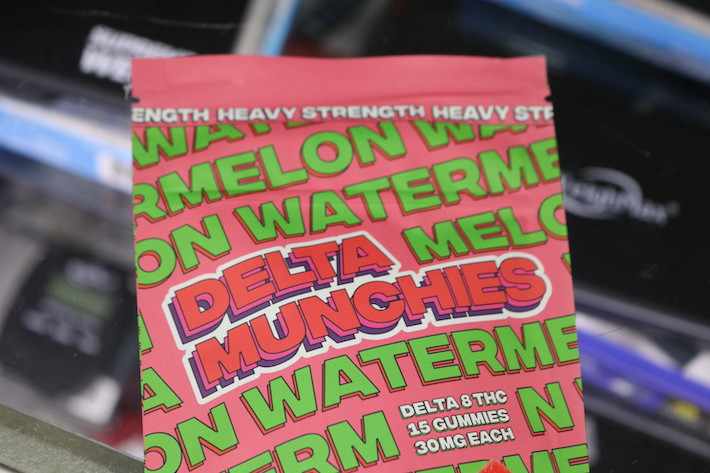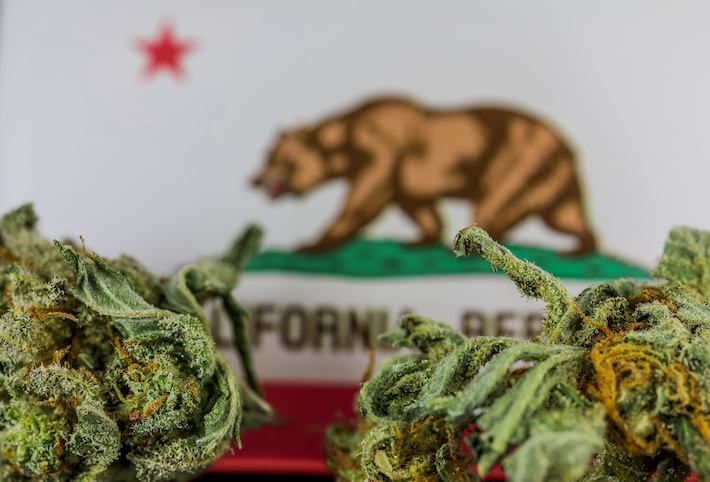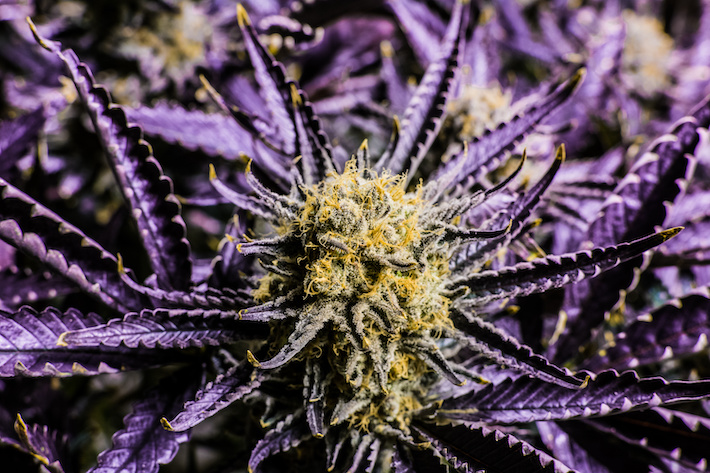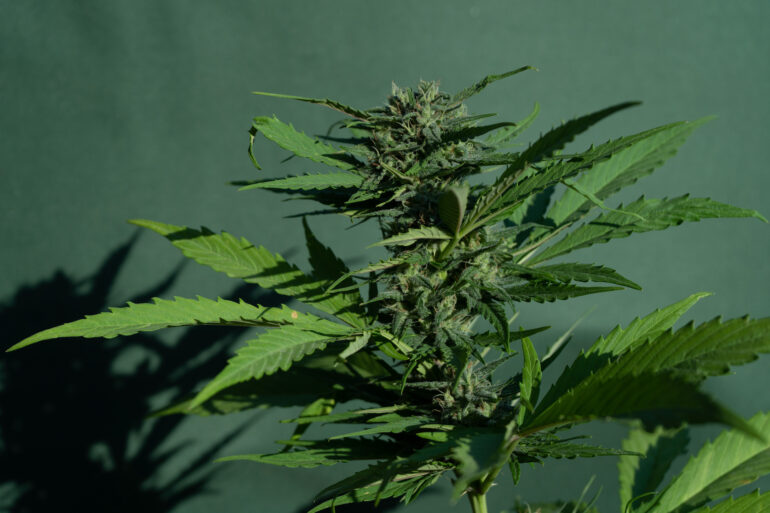Despite having legalized cannabis in the state, delta-8 THC is heavily restricted in California.
Lawmakers passed a bill that classifies any delta-8 THC product as a marijuana product – unless they are produced in a frankly unrealistic fashion – and this means that delta-8 is under the jurisdiction of the Department of Cannabis Control.
This essentially means that although delta-8 THC is technically legal in the state, it must be sourced from cannabis and is held to the same high standards as regulated products.
If you’re not familiar with the adult use of marijuana rules in California, here’s a quick run-down of what you need to know.
Is Delta-8 THC Legal to Sell in California?
Only cannabis-derived delta-8 THC is legal to sell in California, with all hemp-derived delta-8 THC currently banned from sale in the state.
Assembly Bill (AB) 45 specifically redefined “THC” to include delta-8, delta-9, delta-10 and other THC isomers. It also includes any cannabinoids the California Department of Public Health deems to cause intoxication.
Under this new definition, hemp products can only carry 0.3% of any THC. No legal hemp product can contain more than 0.3% delta-8, delta-9, delta-10, or any other intoxicating cannabinoid combined. Additionally, the law specifically excludes cannabinoids created through chemical synthesis, which means that no commercial delta-8 THC product can be sold as hemp in the state.
AB 45 also tasked the Department of Cannabis Control (DCC) with creating a report for the legislature on the addition of hemp-sourced cannabinoids into the adult use market, but this has yet to be completed. As such, all delta-8 THC sold in licensed dispensaries in the state must be derived from cannabis.
RELATED: Delta-8 THC Legality by State
According to a statement from a CDPH representative sent to CBD Oracle by email, the CDPH “also has the authority to further regulate the number of intoxicating cannabinoids, as needed in future regulations to ensure consumer safety.”
See the full statement below:
Assembly Bill 45 (Aguiar-Curry, 2021) established the framework for the California Department of Public Health (CDPH) to regulate certain industrial hemp products, including those that contain Delta-9 tetrahydrocannabinol and Delta-8 tetrahydrocannabinol. Though Delta-9 may be the most common tetrahydrocannabinol (THC), the current statutorily defined limit of THC in industrial hemp products, regardless of the type, is a concentration of no more than 0.3 percent on a dry weight basis. CDPH also has authority to further regulate the amount of intoxicating cannabinoids as needed in future regulations to ensure consumer safety. As always, CDPH strives to ensure all regulated commodities within its jurisdiction are safe, effective and not misrepresented in the marketplace.
Delta-8 THC Legislation Timeline for California
Delta-8 THC was first legalized in California in 2019, and restrictions came into force in 2021 which means it must be derived from marijuana and cannot be converted from hemp CBD, even in the state’s regulated marijuana program.
The first major hemp bill to pass in California was Senate Bill (SB) 566, which passed in 2013 and established a basic, “fiber or oilseed crop” hemp market. It also placed limitations on hemp seed cultivars and more. Most of these restrictions were lifted in 2018, with SB 1409.
After the federal Farm Bill passed, 2019’s SB 153 updated California law to match the definitions used at the federal level. As a result, this bill allowed the use, possession, sale, and production of hemp-derived delta-8 products, provided they were within the limit of 0.3% delta-9 THC.
AB 45 was signed into law in 2021, and this bill essentially excluded all delta-8 THC products from the definition of hemp. The bill both made the THC limit apply to all THCs and prohibited the process used to produce delta-8 THC from hemp-derived CBD.
San Diego city has issued a warning to hemp stores in line with AB 45, reminding them that “synthetic cannabinoids” (which includes delta-8, by the state’s definition) are illegal in the state. They also seized products and arrested four people in December 2023.
Can Delta-8 THC Be Added to Food?
Despite federal restrictions on adding delta-8 THC into foods in interstate commerce, California law exempts cannabis edibles. This means you can add cannabis-derived delta-8 THC to foods in the regulated cannabis market, but they can’t be sent out of state.
The federal Food, Drug and Cosmetic Act (FD&C Act) essentially makes it illegal to add delta-8 THC into food that is sold between states, because it “adulterates” the food. However, if state law explicitly addresses the issue and makes an exception, then you can include it in foods that remain within the state.
The Medicinal and Adult-Use Cannabis Regulation and Safety Act states that edible cannabis products are not considered “food” in the state. This means California law doesn’t consider delta-8 THC to adulterate food, because delta-8 is cannabis and cannabis edibles aren’t “food” in the traditional sense.
Can You Buy Delta-8 in California?

You can buy delta-8 THC products in California at state-licensed dispensaries. However, since delta-8 THC is not hemp in the state, these are the only places legally allowed to sell it.
Delta-8 Alternatives You Can Legally Buy in California
Like delta-8, you cannot purchase hemp-derived delta-10, THC-O, or HHC in California, because the state bans the chemical synthesis process used to create them. The state regulates all intoxicating delta-9 THC isomers and might potentially restrict other intoxicating cannabinoids in the future.
RELATED: What’s the Difference Between Delta-8 and Delta-9?
Are There Age Restrictions on Delta-8 THC Products?
Delta-8 THC is considered cannabis in California, so you can only buy delta-8 products if you’re aged 21 or over.
Can You Consume Delta-8 THC in Public in California?
It’s illegal to use delta-8 THC or ordinary cannabis in public in California.
When California legalized cannabis, lawmakers clearly established that you can’t use in public. In particular, you can’t smoke or ingest marijuana in any public place – especially smoking somewhere smoking is banned – and you can’t smoke within 1,000 feet of a school, daycare or youth center if youth are present, unless it’s on the grounds of a private residence.
There is an exception to this rule if someone licensed as a cannabis retailer or micro-business, provided:
- That the consumption area is only accessible by people aged 21 or over
- That the consumption area can’t be seen from public places or from non age-restricted areas
- That alcohol and tobacco are not sold on the premises.
Can You Drive Under the Influence of Delta-8 THC in California?

Driving under the influence of delta-8 THC is illegal in California.
RELATED: Can Delta-8 THC Get You High?
State law makes it clear that it is illegal to drive under the influence of any drug, or even while addicted to any drug unless you’re currently in treatment. This is also explicitly stated in the state’s cannabis code, and it’s even illegal to drive with an open container or package of marijuana.
Penalties for a first offense are between 96 hours and six months in county jail and a fine of between $390 and $1,000. Your license will also be suspended for 6 months and you’ll have to complete a DUI program.
Can You Travel to California With Delta-8?
You shouldn’t cross California state borders with delta-8 THC products in your possession, because the state considers it the same as marijuana.
Unfortunately, while anything containing less than 0.3% combined THC would be considered hemp in California; all delta-8 THC is made using chemical synthesis, which excludes it from the definition of hemp. This means that although you could travel across state lines with compliant hemp products, every delta-8 THC product is considered marijuana by default.
Closing Thoughts: The Future for Delta-8 in California

Delta-8 THC is considered marijuana in California, so unless there was another major change in the definition of hemp, any change to cannabis law in the state could impact delta-8. However, at present there aren’t any major changes pending.
However, AB 1207 aims to stop cannabis products being designed or marketed in a way that appeals to children. It would also stop any inhalable products from containing natural or synthetic flavors (or even descriptions of flavors). The bill is currently working its way through the Senate.
Aside from this, the laws pending at the moment tend to be related to more minor issues, such as AB 374, which aims to allow licensed retailers with a cannabis consumption area to also sell non-cannabis food. Likewise, AB 1610 would require proficiency testing of cannabis labs and create a reliable and replicable testing method to use.
Overall, it seems the situation for delta-8 THC in California is likely to stay this way for some time.
Editor’s note: We updated this article on January 16, 2024, to include a note about the recent store raid and arrests in San Diego.
